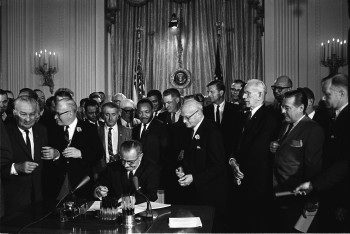Legal Protections for Working Women in US Law Might Have Been a Joke
![]() In a fascinating article in the Industrial-Organizational Psychologist, Scott Highhouse1 discusses why legal protections provided to women under Title VII of the Civil Rights Act of 1964 might have been included by lawmakers as a joke – or more specifically, as a way to make the bill so ridiculous that it would not pass a congressional vote.
In a fascinating article in the Industrial-Organizational Psychologist, Scott Highhouse1 discusses why legal protections provided to women under Title VII of the Civil Rights Act of 1964 might have been included by lawmakers as a joke – or more specifically, as a way to make the bill so ridiculous that it would not pass a congressional vote.

President Lyndon Johnson signs the Civil Rights Act of 1964 into law under the eyes of Martin Luther King, Jr. and other leaders of the civil rights movement.
If you’re unfamiliar with this legislation, the CRA of 1964 was landmark legislation at the height of the US Civil Rights Movement that defined illegal discrimination of a variety of types. The focus of the CRA was the end of segregation – the legal requirement of people of different races to use different buses, restaurants, restrooms, and so on. Title VII was the section of the CRA of 1964 dealing with employment rights.
Protections for women were only added to the bill in its 11th hour by Democratic Representative Howard Smith of Virginia. According to the congressional record, when Smith introduced the amendment to include women, Congress laughed.
Highhouse describes it this way:
One can imagine this scene playing out like an episode of Mad Men, a fictional television series set in the 1960s. Indeed, it seems that Judge Smith was introducing this amendment because it would be seen, in 1964, as completely absurd to provide protection to women against unfair treatment in the workplace. After all, Smith ultimately voted against the Civil Rights Act of 1964.
It’s difficult to say this definitively; Smith later did in fact support women’s rights in other non-race-related legislation. But this may in fact explain his behavior; Smith was a vocal supporter of “white superiority” and spoke of his concern that the passage of the CRA of 1964 might disadvantage white women. By introducing his amendment, he could protect this group even if the CRA passed (which it did). Smith died in 1976, so it’s unlikely that we’ll ever know for sure.
The full article in TIP is available for free; if you’d like more detail on this issue, have a look!
- Highhouse, S. (2011). The history corner: Was the addition of sex to Title VII a joke? Two viewpoints.
The Industrial-Organizational Psychologist, 48 (3), 102-107 [↩]
| Previous Post: | Semester Break Announcement |
| Next Post: | Online Plagiarism and Cybercheating Still Strong – 61.9% |


